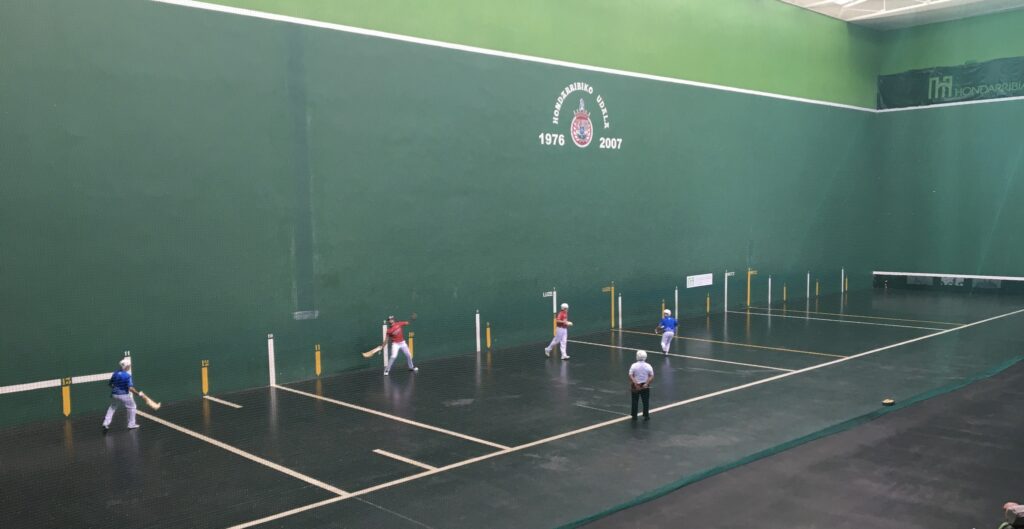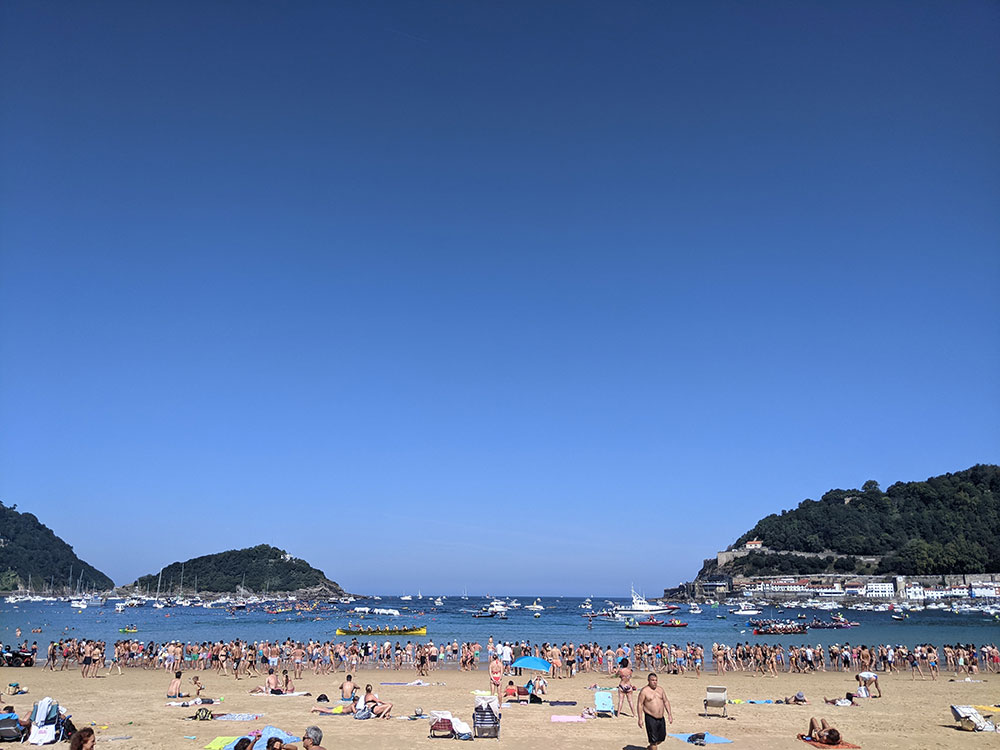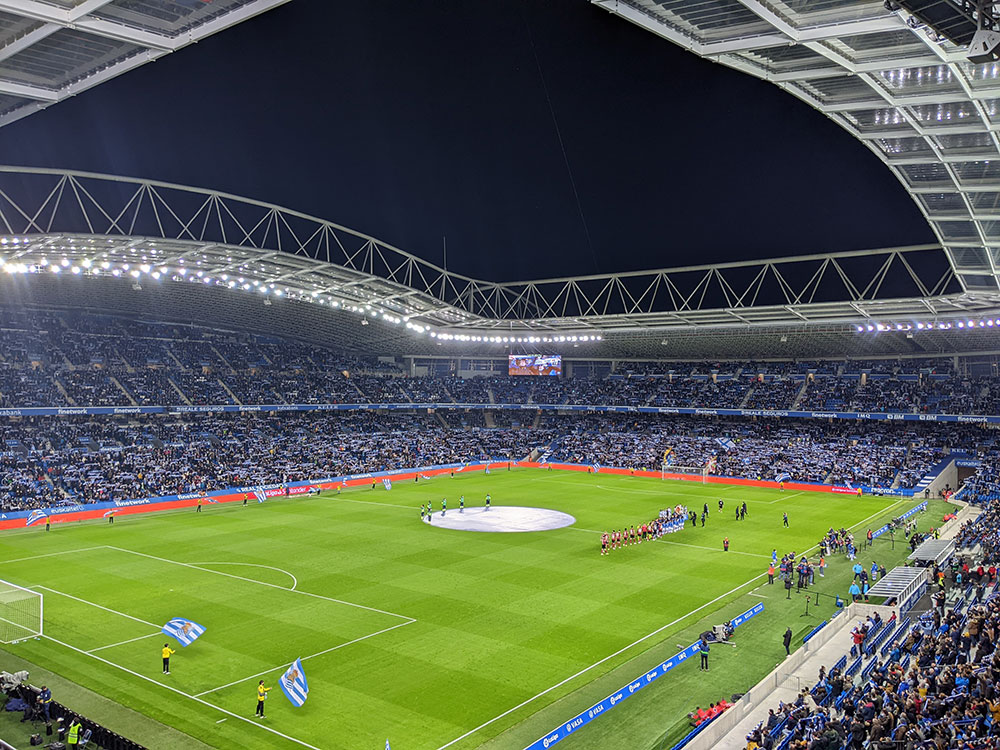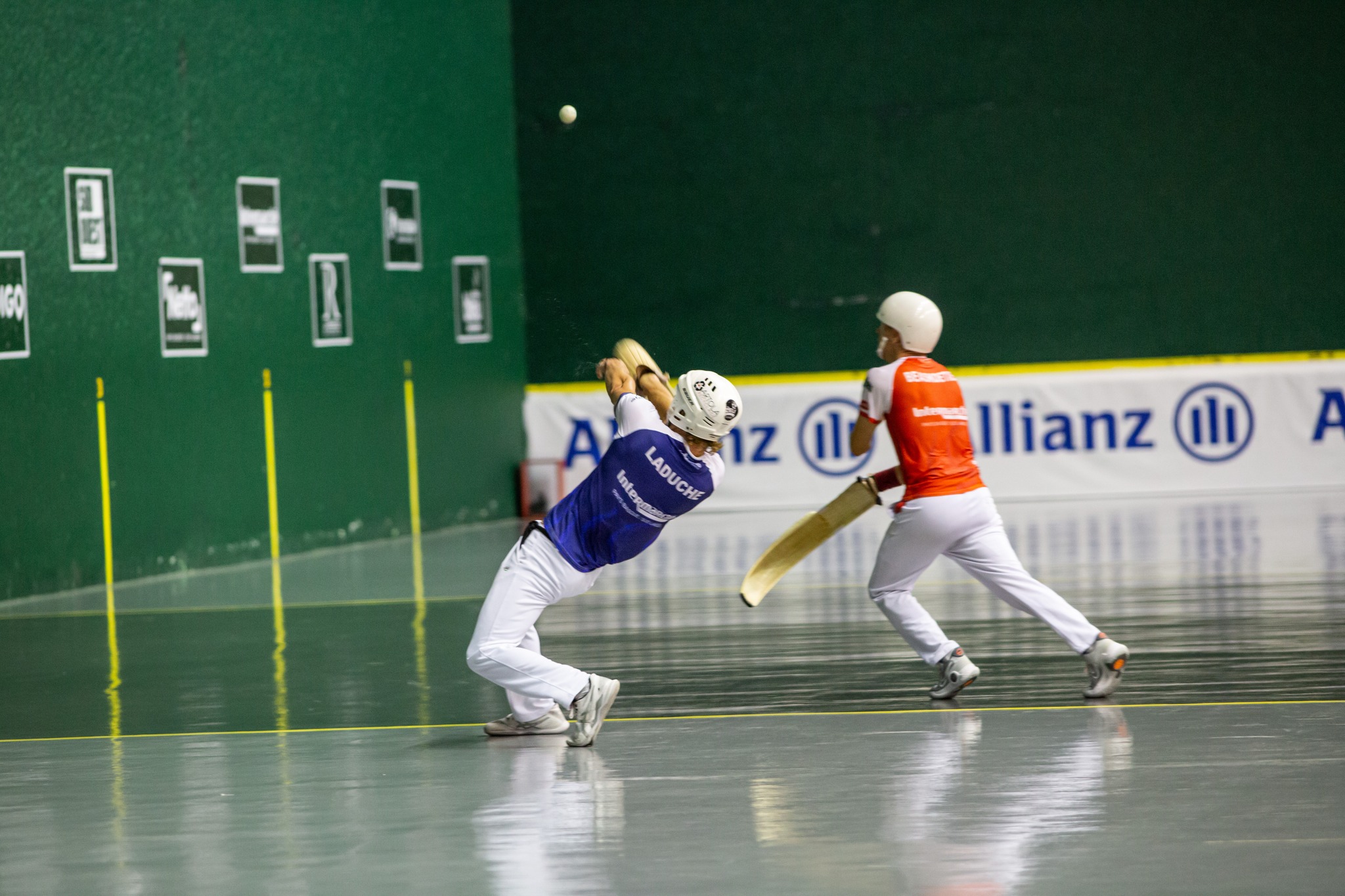Football, cycling and surfing are all popular sports in the Basque Country.
But for hundreds of years the Basque people have also engaged in their own traditional sports.
There are many different traditional Basque sports, but they all typically originate from the rural areas and farms, where the workers added a competitive spin to mundane everyday tasks.
Overtime they’ve evolved and become more professional, with official governing bodies and professional sportsmen and women.
In this article, we’ll run through some of the top Basque sports.
Basque Pelota

One of the most popular and most traditional Basque Sports is Basque Pelota.
The sport has origins dating back hundreds of years, and there’s even evidence of ancient cultures playing similar games.
There are a number of different variants of Basque Pelota, but they all have the same underlying principle – hit the ball against the main wall of the frontón (court).
Pelota Mano (HandBall) is perhaps the most basic form of the sport. As the name suggests, this variation of the sport doesn’t involve any racquets or special gloves. It involves you using your bare hand to hit the pelota (ball) against the frontón wall.
Cesta Punta or Jai Alai is another popular variation of the sport. And as its name “Cesta” (basket) Punta (tip or point) also suggests, it involves players using a pointed reeded basket to throw the ball against the frontón.
Jai Alai is also famous outside of the Basque Country with professionals competing in France, Latin America and even the USA.
Outside of the two most popular variations of Basque Pelota, there also exist a number of different variations with different types of racquets.
Traineras Regattas (Rowing)

Another sport that evolved out of workers performing daily duties (this time fishermen) is the traineras regattas or rowing.
The boats were typically used to bring in the daily catch to the local markets. And of course, it was always a race back to the port!
Today, it’s a serious and fiercely competitive sport in the Basque Country and Cantabria.
The rules of the sport differ from the likes of the rowing events in the Olympics, largely down to the team and equipment.
Firstly, there’s a crew of 13 rowers to each boat. 12 row in pairs with the 13th sits alone in the bow (called a bowman or bow-woman). Like most team rowing events, there’s also a cox that stands facing the team and is largely responsible for controlling the steering of the boat.
With regards to the equipment, the boats were traditionally made from beech wood – and weighed a ton! Nowadays modern traineras are made from carbon fibre and have to adhere to strict weight and size regulations.
One of the biggest events, “La Bandera de La Concha”, takes place each year on La Concha beach in San Sebastian in September.
It makes for a great spectacle with galleries lining Paseo Nuevo, Monte Urgull and Santa Clara Island to get a glimpse of the action.
Herri Kirolak (Basque Rural Sports)
Herri Kirolak are typically referred to as the Basque rural sports. They are the sports that have largely originated from mundane farming or countryside tasks!
They traditionally took place in the main plazas (squares) in Basque towns and their popularity revolved around betting.
In total there are around 18 official Herri Kirolak (shortened to HK18). You can check out all of them here (in Spanish), but we’ll run through the most popular rural sports below.
Aizkora (Wood chopping)
This sport emerged from the forests and the collection of wood.
There are different competing formats, but the basic premise of the sport is to chop the wood as quickly as possible or in as many blows as possible.
Sometimes this is one larger trunk, or in other formats it’s a number of trunks laid out consecutively (between 36 – 72 inches circumference).
The aizkolaris (wood choppers) use an axe to beat their way through the truck, which they’re standing on top of!
Trontza-zerra (Trunk cutting with a saw)
Sticking with the sports that emerged from the forests, another variation of larger tree cutting is Trontza-zerra.
But instead of brute force, this one involves a little more grace and coordination. This is largely in part due to the fact you have a partner and manual saw to help get your way through the trunk.
The pairs compete head to head, with the winners being the first to finish 22 compete cuts.
Harrijasotze (Stone Lifting)
Perhaps the most famous and internationally travelled Basque rural sport is Harrijasotze or stone lifting.
It’s a sport that came from the quarries in the preparation of stones to be transported.
Again there are a number of different ways the sport is played out, but usually this involves lifting a very heavy stone from the ground to shoulder height, using nothing but your hands!
Lifters compete to either lift the heaviest stone possible (Mikel Saralegi holds the current record, lifting 329kg in 2001), or lifting a medium weight stone (around 100kg) as many times as possible. The record for this is 1,000 100kg lifts in 5 hours 4 minutes (source)!
Both are shows of brute strength! They take place at stone-lifting exhibitions in festivals or fairs in Basque towns during the summer.
Sokatira (Tug of war)
One sport that every child has probably played at some point growing up is tug of war.
In the Basque Country sokatira or tug of war is pretty much the same as anywhere else in the world, except it’s pretty competitive with official associations and clubs.
The two teams of 8 people pull as hard as they can to drag the ribbon on the rope (and the opposite team) to the middle dragging area on the ground. The winners are the team that manage to overpower their opponents.
Other popular sports in the Basque Country

Outside of the traditional Basque Sports that have origins from the Basque region, there are plenty of international sports that are popular.
Football, or soccer, is one of the most popular sports (like most places in Europe).
You’ll regularly find kids playing football in the local frontóns or in the main plazas in the Basque towns. They even hold kids’ football tournaments on La Concha Beach in Spring and Autumn when there’s low tide.
Support for the Basque football teams is also strong.
Athletic Bilbao, Real Sociedad (who play in the Anoeta Stadium), Eibar and Deportivo Alaves are all teams that have competed in La Liga and even Europe in recent years.
The Basque Country also has a national football team. But it’s not affiliated with FIFA meaning they only play the occasional friendly match.
Basketball is another popular sport with school playgrounds usually having a couple of courts.
And with all the mountains in the Basque Country, cycling is another popular sport. Many of the top riders in the world come to train in the Basque region.
The Clásica San Sebastián is one of the most important single day racing events on the cycling calendar. It’s also one of the top sport events in San Sebastian.
Lastly, people come from all over the world to La Zurriola and Zarautz beach to try their hand at surfing. These spots along the Basque coast have some of the best waves in Europe, making them popular destinations for surfers.
